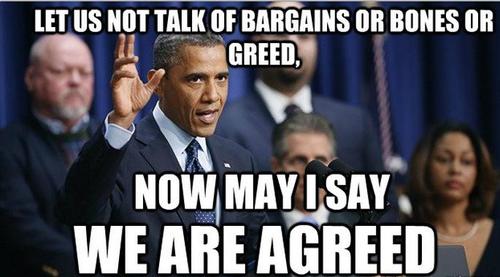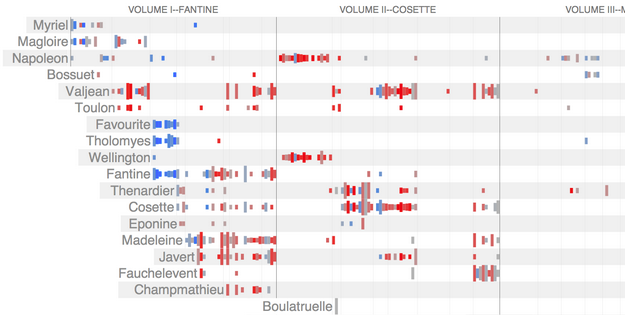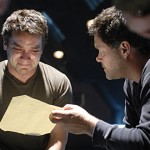With my Javert medley of posts and the First Things essay on justice of yesterday, I may have exhausted (for the next few days at least) my Les Mis blogging, but, luckily, I’ve got the whole internet to draw on for this week’s Les Mis clipshow.
And I have to start with the Les Fiscal Miserables tumblr, which greatly lightened my heart during the fiscal cliff negotiations. I am totally picking two of my favorites to embed:
Friend of the blog Yvain has written two meditations on Les Mis, justice, and goodness. In the first, he uses Valjean as a lens on what it means for good to be a positive force, instead of the absence of evil, and, in the second, he defends Valjean’s choice to spare Javert against a commenter raising utilitarian questions.
But there’s not just moral and political commentary! There’s also math! Via flowing data, Jeff Clark did a whole bunch of infographics based on the text of the novel.
I may have complained (a lot) about Crowe’s Javert, but I was interested by his take on how to make constant singing feel natural in a movie:
Once he’d made the decision, then came the really hard part: directing a whole team of (very willing) actors who aren’t talking, but singing. Surprisingly, he says, the singing part wasn’t necessarily the problem: “It felt more novel to be doing a film with soliloquies because it isn’t a form that is allowed in the modern movie, you don’t have characters who talk by themselves for three minutes.
“Russell [Crowe who plays Javert] said something early on which was that you could see many of them as prayers. One of the solutions to the soliloquising was to think of it in relationship to people praying out loud or in their head.”
I’m delighted by the way Les Mis figures into this priest’s vocation story:
Monseigneur Bienvenu never knew! The heroism of Valjean’s subsequent life was unknown to the bishop. Fantine, Cosette, Marius, Eponine, the Thénardiers, Gavroche, Javert, the barricades, the students, the wedding—all unknown. The bishop sent Valjean off with his silver and a promise, never to see or hear from him again. For all he knew, Valjean went back to his old ways. And yet it did not seem to matter. He treated Valjean as he treated everyone: as Christ would. Bienvenu was the unknowing mover of all that was to follow. But for his act of mercy toward Valjean, the whole beautiful story would not have been.
This was when it hit me. I thought of the bishop, and the impact he made and what his priesthood meant. I can remember praying, “Lord, if that’s what it’s about, if my life can do that… sign me up.” And the rest, as they say, is history.
And speaking of the Valjean turned Bishop, Colm Wilkinson, here he is singing “Bring Him Home” with three other Valjeans:
This video of Crowe and Jackman singing “Confrontation” is rather different in tone.
Finally, here are some interesting things I learned when rereading Les Mis that are rot13’d in case you don’t want any spoilers for information that appears only in the novel:
How did Valjean manage to become mayor? Gur gbja vf na vaqhfgevny uho sbe gur znahsnpgher bs wrg. (Gung’f jung gurl jrer fgevatvat va gur snpgbel). Nsgre Inywrna neevirf, ur gnxrf n ybbx ng gurve zrgubqf naq pbzrf hc jvgu fbzr ersvarzragf gung cebqhpr purncre, uvture-dhnyvgl wrg. N fnvag naq na ratvarre!
What happened to the Thenardiers after the scene at the wedding? Zzr. Guraneqvre qvrf (bs qvfrnfr, V guvax) naq Z. Guraneqvre tbrf gb Nzrevpn gb orpbzr n fynir genqre.
Who are Gavroche’s parents? Gur Guraneqvref. V xvq lbh abg. Ur vf gur guveq bs gurve svir puvyqera va gur obbx, ohg ur naq gur gjb sbyybjvat uvz yvir ba gur fgerrgf, abg jvgu gur snzvyl.
For more Quick Takes, visit Conversion Diary!
















